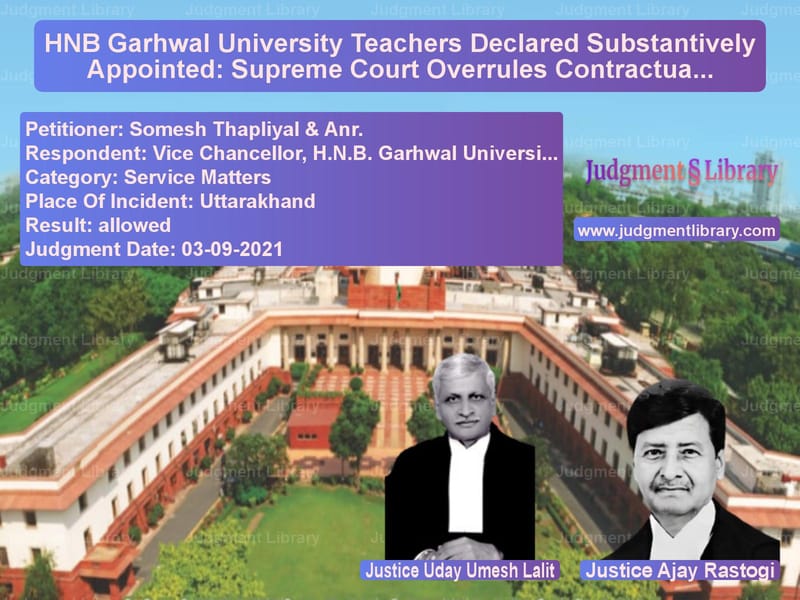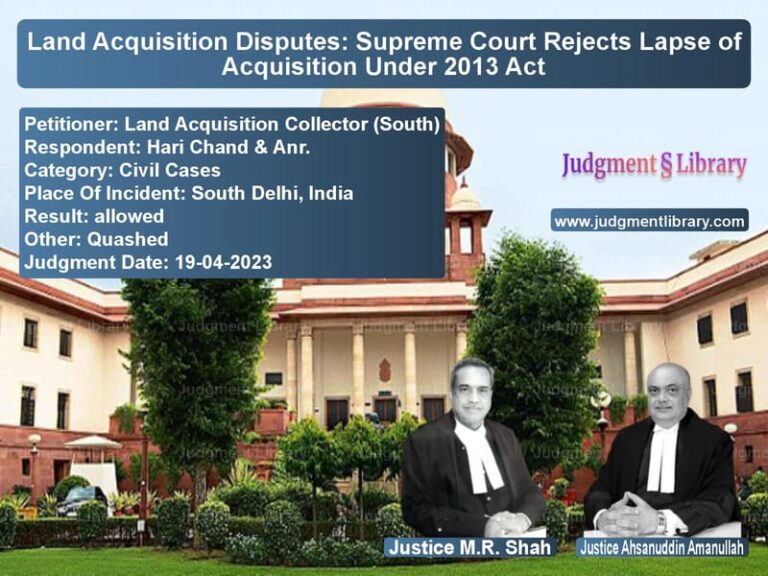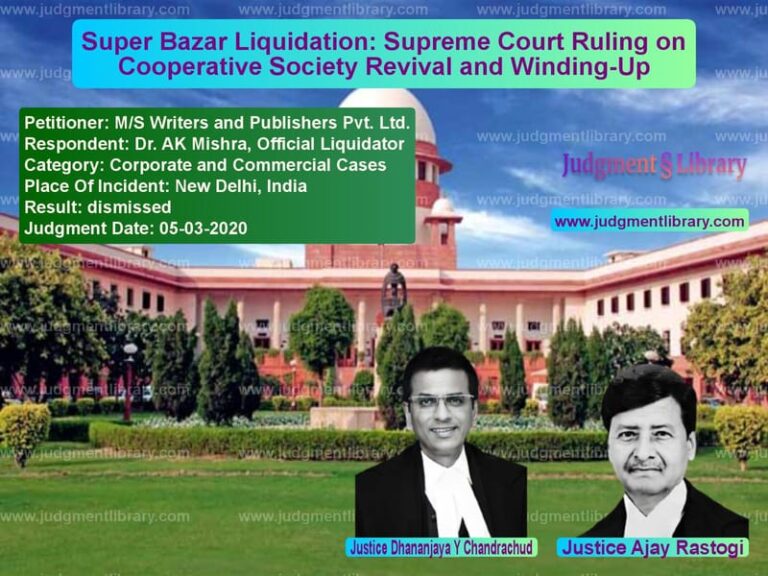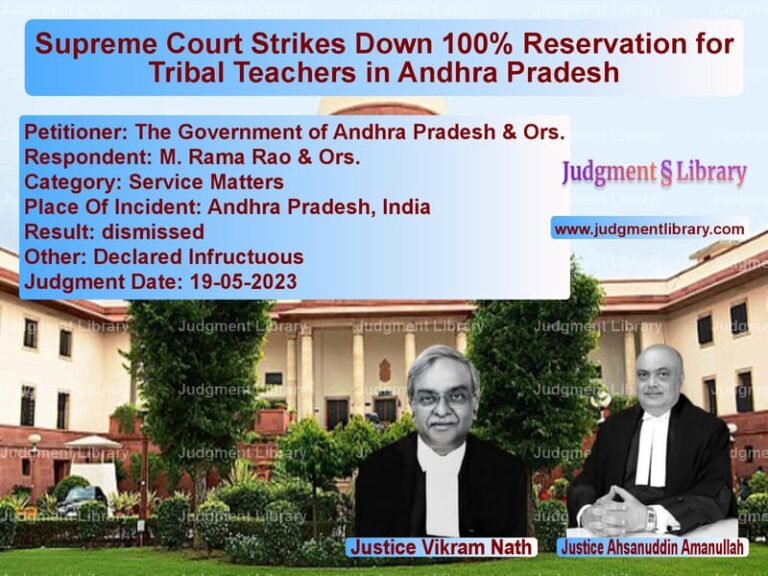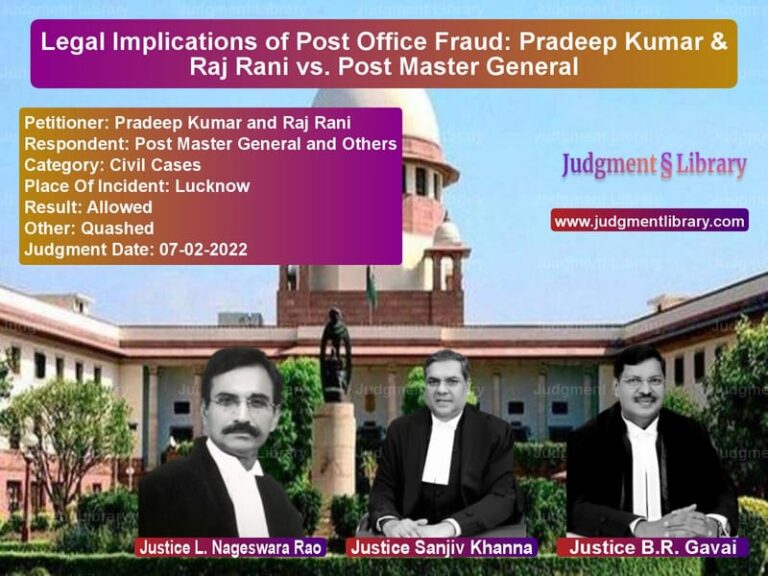HNB Garhwal University Teachers Declared Substantively Appointed: Supreme Court Overrules Contractual Terms
The case of Somesh Thapliyal & Anr. v. Vice Chancellor, H.N.B. Garhwal University & Anr. concerned the employment status of teachers in the Department of Pharmaceutical Sciences at HNB Garhwal University. The key issue was whether their appointments were substantive or merely contractual under the self-financing scheme. The Supreme Court examined the legitimacy of their appointments and ruled in favor of the teachers, declaring them as substantive employees of the Central University.
Background of the Case
The dispute involved teachers appointed as Associate Professors and Assistant Professors in the Department of Pharmaceutical Sciences at HNB Garhwal University between 2004 and 2007. Their appointments were made following a regular selection process under the Uttar Pradesh State Universities Act, 1973 (Act 1973), before the University was converted into a Central University under the Central Universities Act, 2009 (Act 2009).
Initially, the department operated under a self-financing scheme, meaning financial liabilities were borne by the University itself. The teachers were hired through a duly constituted selection process, yet their appointment letters designated them as “contractual” for a term of three years, subject to renewal. They were later given extensions, and after the university’s conversion to a Central University, their posts were formally sanctioned and approved by the University Grants Commission (UGC).
The issue arose when the Central University issued an advertisement in 2011 to recruit new faculty members. The affected teachers, fearing displacement, approached the High Court, seeking recognition of their appointments as substantive under the Central University. However, the Division Bench of the Uttarakhand High Court ruled against them in 2013, leading to an appeal in the Supreme Court.
Key Legal Questions
- Were the appointments of the teachers substantive, or were they merely contractual?
- Did the inclusion of “contractual” terms in their appointment letters override the statutory process followed under Act 1973?
- Should the teachers be absorbed as regular employees of the Central University after its conversion?
Arguments by the Petitioners (Teachers)
The teachers contended that:
- They were selected following the statutory process prescribed under Act 1973, which governs substantive appointments.
- Their appointment letters included arbitrary “contractual” terms, which were never disclosed at the time of selection.
- They were not in an equal bargaining position and had no option but to accept the terms under economic duress.
- After the university was converted into a Central University, the UGC sanctioned their posts as permanent faculty positions.
- Section 4(d) of the Central Universities Act, 2009, protects employees appointed before conversion, guaranteeing continuity of service.
Arguments by the Respondents (University)
The University argued that:
- The Department of Pharmaceutical Sciences initially operated under a self-financing scheme, meaning posts were not government-funded.
- The teachers signed contracts that explicitly stated their appointments were for a limited term.
- The Central University had the authority to conduct fresh recruitments as per its regulations.
- Since the affected teachers did not participate in the 2011 selection process, they had no right to claim absorption into the Central University.
Supreme Court’s Analysis
The Supreme Court, comprising Justices Uday Umesh Lalit and Ajay Rastogi, examined whether the teachers’ appointments were substantive and whether their rights were protected after the university became a Central University.
Key Findings
- Regular Selection Process Followed: The Court noted that the teachers were appointed following a proper statutory process under Act 1973.
- Arbitrary Contractual Terms: The University arbitrarily included contractual conditions in the appointment letters despite appointing them through a substantive process.
- Economic Duress: Since the teachers were not in an equal bargaining position, they had no real choice but to accept the conditions imposed.
- Post-Sanctioned by UGC: The Central University recognized these faculty positions, meaning they were no longer under a self-financing scheme.
- Protection Under Act 2009: Section 4(d) of the Central Universities Act protected their service continuity.
Key Observations by the Supreme Court
“The appellants were appointed pursuant to a regular selection process under Act 1973. Once such a process has been followed, their appointments cannot be treated as contractual simply because the University added arbitrary conditions in their appointment letters.”
“The respondents cannot use the self-financing nature of the department at the time of appointment as a reason to deny substantive status, especially when the UGC has now sanctioned these posts.”
Final Judgment
The Supreme Court ruled in favor of the teachers and held that their appointments were substantive and not contractual. The Court:
- Quashed the Uttarakhand High Court’s judgment.
- Declared the petitioners as substantively appointed teachers of HNB Garhwal University.
- Ordered that they be recognized as regular faculty members with all benefits.
- Directed that they be granted notional benefits as per Central University norms.
Implications of the Judgment
This ruling has several significant implications:
- Protection of Employees’ Rights: It reinforces that employees hired through statutory processes cannot be arbitrarily treated as contractual workers.
- Equal Bargaining Power in Employment: It acknowledges that employees cannot be forced to accept unfavorable terms when they have no real choice.
- Recognition of UGC-Sanctioned Posts: Ensures that teachers in similar situations benefit from formal recognition.
- Legal Precedent for Higher Education Employees: The ruling clarifies that government-converted institutions must respect prior appointments.
Conclusion
The Supreme Court’s ruling in Somesh Thapliyal v. Vice Chancellor, H.N.B. Garhwal University serves as a landmark decision in employment law for university faculty members. By recognizing the substantive nature of the teachers’ appointments and nullifying arbitrary contract terms, the judgment safeguards employees from unfair employment practices. This ruling sets a strong precedent for similar cases in public universities and higher education institutions across India.
Petitioner Name: Somesh Thapliyal & Anr..Respondent Name: Vice Chancellor, H.N.B. Garhwal University & Anr..Judgment By: Justice Uday Umesh Lalit, Justice Ajay Rastogi.Place Of Incident: Uttarakhand.Judgment Date: 03-09-2021.
Don’t miss out on the full details! Download the complete judgment in PDF format below and gain valuable insights instantly!
Download Judgment: somesh-thapliyal-&-a-vs-vice-chancellor,-h.n-supreme-court-of-india-judgment-dated-03-09-2021.pdf
Directly Download Judgment: Directly download this Judgment
See all petitions in Employment Disputes
See all petitions in Public Sector Employees
See all petitions in Recruitment Policies
See all petitions in Judgment by Uday Umesh Lalit
See all petitions in Judgment by Ajay Rastogi
See all petitions in allowed
See all petitions in supreme court of India judgments September 2021
See all petitions in 2021 judgments
See all posts in Service Matters Category
See all allowed petitions in Service Matters Category
See all Dismissed petitions in Service Matters Category
See all partially allowed petitions in Service Matters Category

